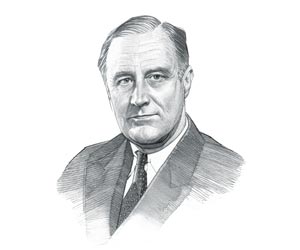|
|
|
|
|
FDR wanted legislation that would provide “security against the hazards and vicissitudes of life” for unemployed workers and the elderly through social insurance. FDR, his Secretary of Labor Frances Perkins and her team spent months preparing the bill. The bill became law on August 15, 1935 and established an unemployment insurance system, a national pension fund, benefits for victims of industrial accidents, and a public assistance program for dependent mothers and disabled people. Facts about
Social Security Act of 1935 In the President's Message to Congress on June 8, 1934 recommended Federal legislation to promote economic security. FDR stated: "Among our objectives I place the security of men, women and children of the nation first." On June 29, 1934 FDR went on to create the Committee on Economic Security (CES) to study the problems relating to economic security and to make recommendations for a program of legislation.On January 4, 1935 FDR's message to Congress called for legislation to provide assistance for the unemployed, the aged, destitute children and the physically handicapped. Following the furor surrounding the "Court Packing Plan" the Social Security Act was upheld by the Supreme Court in April 1937. The bill became law on August 15, 1935 with provisions for an unemployment insurance system, benefits for victims of industrial accidents, a national pension fund, and a public assistance program for dependent mothers and disabled people.On October 1, 1935 the Committee on Economic Security (CES) terminated when the new law created the Social Security Board (SSB) to oversee the administration of the new program. The Chairman of the Board (SSB) was John G. Winant with Arthur J. Altmeyer and Vincent M. Miles as the other Board members. Social Security is a program of public provision in which the government provides money to people who are unable to work because they are unemployed, old or disabledSocial security tax is used to pay for the program. Under the 1935 Act, the federal government began collecting the Social Security tax from workers in 1936 and began making payments in 1940. Critics of the 1935 law disliked the process by which money was obtained by payroll taxes that were imposed on workers and employers.A key part of Social Security was the monthly retirement benefit which people could collect when they stopped working at the age of 65 years old. The first person to receive monthly retirement benefits was Ida May Fuller of Brattleboro, Vermont. Her first check, dated January 31, 1940, was for the amount of $22.54 Another important benefit was unemployment insurance which supplied a temporary income to unemployed people looking for work.On January 1, 1936 the Federal unemployment tax, initially set at 1% became applicable to employers of eight or more, with a credit offset for contributions paid to State unemployment funds. It was increased to 2% of payroll January 1, 1937. The Federal Reorganization Act of 1939 became effective on July 1, 1939. Under this law, the Board was made part of the newly established Federal Security Agency (FSA)The program initially left out domestic and farm workers which affected many Americans including over 60% of African Americans who worked in these jobs Despite the failings, which were later addressed, Social Security helped many people during the Great Depression. Although in its infancy, Social Security established the principle that the federal government should be responsible for needy people, who through no fault of their own, were unable to work. The Social Security Act of 1935 remains one of the most important pieces of legislation in the history of America |
| US American History |
| 1929-1945: Depression & WW2 |
|
|
|
|
|
First Published2016-04-19 | |||
|
Updated 2018-01-01 |
Publisher
Siteseen Limited
| ||
|
|

